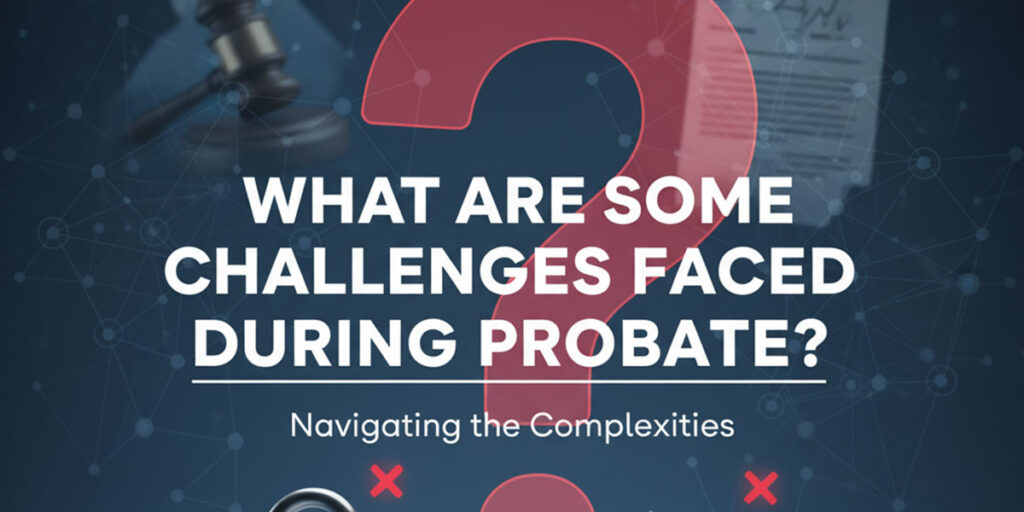Top Challenges Faced in New York Probate
In my three decades as a New York probate attorney, I have guided countless families through the process of settling a loved one’s estate. While probate is often described as an orderly, court-supervised procedure, the reality is that the path from filing a will to distributing the assets is rarely a straight line. It is a journey that is often fraught with unexpected roadblocks, emotional turmoil, and complex legal hurdles. For an executor or beneficiary navigating this path for the first time, these challenges can feel overwhelming.
The purpose of the probate process is to ensure a decedent’s final affairs are settled correctly: that their will is validated, their debts are paid, and their assets are passed to the rightful heirs. However, this process must account for the complexities of family dynamics, financial realities, and strict legal procedures. When these elements clash, challenges arise that can delay the settlement of the estate, increase its cost, and inflict significant stress on grieving families.
At Morgan Legal Group, we see ourselves as expert navigators for this challenging journey. Our role is to anticipate these roadblocks and steer our clients around them. This guide is a roadmap to the most common challenges faced during the probate process in New York. By understanding these potential issues in advance, you can be better prepared to face them, armed with knowledge and a clear sense of direction. For expert guidance through any probate matter, please contact our firm.
Challenge #1: The Will Contest – When Family Disputes Erupt
Perhaps no challenge is more emotionally and financially draining than a will contest. This is a formal legal challenge brought in the Surrogate’s Court by a party who believes the will being offered for probate is invalid. A will contest can transform the probate process from an administrative procedure into a full-blown, contentious lawsuit, creating deep and often permanent rifts within a family.
A Cautionary Tale: The Undue Influence Claim
Consider an elderly father in Brooklyn with three children. His original will divided his estate equally. In his final years, he lived with his daughter, who provided his daily care. Shortly before his death, he executed a new will that left the vast majority of his estate to the caregiving daughter and significantly reduced the shares of his two sons. After his death, the sons filed a will contest, alleging that their sister used “undue influence” to coerce their frail father into changing his will. The probate process was halted, and a years-long, expensive legal battle ensued, destroying the siblings’ relationship and depleting the very inheritance they were fighting over.
The Legal Deep Dive: Grounds for a Will Contest in New York
To challenge a will, an objectant must have legal “standing” (typically a disinherited heir) and must prove one of the following grounds:
- Improper Execution: The will was not signed and witnessed according to the strict formalities of New York law.
- Lack of Testamentary Capacity: The decedent was not of sound mind when they signed the will.
- Undue Influence: A third party exerted such strong pressure on the decedent that it overcame their free will.
- Fraud or Forgery: The decedent was tricked into signing the will, or the signature is a fake.
Before filing formal objections, the challenger has the right to conduct pre-objection discovery under Surrogate’s Court Procedure Act (SCPA) § 1404. This allows them to question the attorney who drafted the will and the attesting witnesses under oath.
Navigating the Challenge
An experienced probate attorney is essential in either defending or prosecuting a will contest. For the executor defending the will, we gather evidence of the decedent’s capacity, such as medical records and testimony from friends. The testimony of the attorney-draftsperson is often the most critical evidence. For those with valid concerns about a will, we use the discovery process to uncover evidence of coercion or incapacity. Often, these disputes are resolved through negotiated settlements to avoid the cost of a full trial.
Challenge #2: Locating and Valuing Complex or Hidden Assets
The executor has a fiduciary duty to identify, collect (“marshal”), and protect every single asset that belongs to the decedent’s estate. This sounds straightforward, but it can be a significant challenge if the decedent was disorganized, secretive, or owned complex or unusual assets.
A Cautionary Tale: The Financial Scavenger Hunt
An executor for an estate in New York City knew the decedent was a successful investor but could find very few records. The executor had to piece together the decedent’s financial life by sifting through old mail and tax returns. The process involved sending subpoenas to multiple banks, discovering a forgotten brokerage account, and hiring a forensic accountant to trace a series of complex transactions. Furthermore, the decedent owned a valuable art collection, which required a formal appraisal by a certified expert to determine its value for the estate tax return.
The Legal Deep Dive: The Duty to Marshal Assets
This is one of the executor’s core responsibilities. It is not a passive role. The executor must be proactive in searching for assets. This can include reviewing mail and tax returns, searching property records, and, if necessary, initiating a “Discovery and Turnover Proceeding” under SCPA § 2103 to compel a third party who may be holding estate assets to turn them over. The executor must also obtain formal date-of-death valuations for all assets, as this value becomes the “basis” for future tax purposes and is necessary for filing an accurate estate tax return.
Navigating the Challenge
Organization is key. An executor should immediately secure the decedent’s mail and important papers. Working with a team of professionals, including the estate’s attorney and accountant, is crucial. For unique assets like a business, artwork, or collectibles, hiring a certified appraiser is non-negotiable. This not only ensures an accurate inventory but also protects the executor from claims by beneficiaries that they undervalued an asset. This is a core part of the services we provide in our estate planning and administration practice.
Challenge #3: Dealing with Creditors and Potentially Insolvent Estates
An estate is responsible for the decedent’s legitimate debts. The executor must address all creditor claims before any assets can be distributed to beneficiaries. This can become a major challenge if the estate has significant liabilities or, in a worst-case scenario, is “insolvent” (owes more than it is worth).
A Cautionary Tale: The Insolvent Estate
An estate consisted of a home with $200,000 in equity and $50,000 in a bank account. However, the decedent also had $300,000 in credit card debt and a significant hospital bill. The estate was insolvent. The executor, without legal advice, paid a few of the credit card bills and then distributed the remaining funds to the beneficiaries. The unpaid creditors then sued the executor personally, and the executor was held liable for the funds they had improperly distributed.
The Legal Deep Dive: The Creditor Claim Process in New York
Upon being appointed, the executor should notify known creditors and publish a notice to unknown creditors. Creditors then have seven months from the date of the executor’s appointment to file a formal claim. The executor must then review each claim and either accept it or reject it. If a claim is rejected, the creditor can sue the estate. New York law provides a strict hierarchy for how debts must be paid from an insolvent estate. Funeral expenses, administrative costs, and certain taxes get paid first, before general creditors like credit card companies.
Navigating the Challenge
An executor should never pay debts or distribute assets to beneficiaries until they have a complete picture of the estate’s financial situation and have consulted with an attorney. A probate lawyer can help validate or negotiate creditor claims and will ensure that, in an insolvent estate, payments are made according to the legal priority, protecting the executor from personal liability.
Challenge #4: Identifying and Notifying All Necessary Parties
New York law is very protective of the rights of a decedent’s legal heirs, known as “distributees.” The law requires that every single distributee be formally notified of the probate proceeding, even if they have been completely left out of the will.
A Cautionary Tale: The Long-Lost Cousin
A woman passed away in Queens, leaving a will that gave everything to her close friend. She had no spouse or children and had told her friend she had no other family. The friend, as executor, filed for probate. The court, however, required proof of kinship and a diligent search for any living relatives. A professional genealogist was hired and, after months of research, discovered a first cousin living in another state. This cousin, a legal distributee, had to be formally served with notice of the probate before the case could proceed, causing significant delay and expense.
The Legal Deep Dive: Who are Distributees?
Distributees are the people who would legally inherit under New York’s intestacy laws if there were no will. The law requires they be given notice so they have an opportunity to challenge the will. If a distributee’s location is unknown, the executor must conduct a “diligent search.” If they still cannot be found, the court may require the executor to publish a notice in a newspaper and may appoint a “Guardian Ad Litem” to represent the interests of the missing heir, adding another layer of complexity and cost.
Navigating the Challenge
This is a procedural hurdle that often surprises executors. Working with an experienced probate attorney from the outset is the best way to handle this. An attorney, like Russel Morgan, will know exactly what the court requires for a diligent search and can manage the process of hiring a genealogist if necessary. Getting this step right is crucial to ensuring the probate decree is final and cannot be challenged later on.
Challenge #5: Executor Misconduct, Incompetence, or Conflict
The executor is a fiduciary and is held to a very high standard. Unfortunately, not all executors are up to the task. Some are incompetent or disorganized, while others may engage in outright misconduct, such as self-dealing or failing to communicate with beneficiaries.
A Cautionary Tale: The Rogue Executor
A son was named executor of his mother’s estate. He moved into her house, began driving her car, and refused to provide any information to his two siblings, who were also beneficiaries. He failed to pay the estate’s bills and did not list the house for sale. After more than a year of inaction and secrecy, the siblings were forced to hire an attorney and file a petition with the court to compel the executor to provide an accounting of the estate and to have him removed for breaching his fiduciary duties.
The Legal Deep Dive: Holding Fiduciaries Accountable
Beneficiaries have rights. If an executor is not performing their duties, beneficiaries can petition the Surrogate’s Court for relief. This can include a petition to compel the executor to account, or a petition to revoke their letters and have them removed and replaced. If the executor’s misconduct caused financial harm to the estate, the court can “surcharge” them, meaning they can be held personally liable for the damages. This is a serious issue that can overlap with claims of financial elder abuse.
Navigating the Challenge
Communication is the first step. Beneficiaries should make formal, written requests for information. If the executor remains unresponsive or if there is evidence of misconduct, legal action is the only recourse. An attorney can represent the beneficiaries’ interests in court to hold the executor accountable and get the estate administration back on track.
Conclusion: Navigating the Maze with an Experienced Guide
The probate process, while necessary, is rarely simple. As this guide illustrates, the path can be filled with complex legal requirements, emotional family dynamics, and unexpected financial challenges. From will contests and hidden assets to creditor claims and executor misconduct, these hurdles can turn a difficult time into an unbearable one for those who are unprepared.
However, it is essential to remember that for every challenge, there is a legal solution. For every roadblock, there is a way forward. The key to navigating this maze is not to go it alone. An experienced New York probate attorney is more than just a legal representative; they are a strategic guide, a problem-solver, and a steady hand in a time of crisis. They can anticipate these challenges, protect the executor from liability, and ensure the process is handled as efficiently and correctly as possible.
If you are an executor or beneficiary facing the probate process, do not let these potential challenges overwhelm you. The team at Morgan Legal Group has spent decades navigating the New York Surrogate’s Courts. We have seen and solved every one of these problems. Schedule a consultation today, and let us guide you through the process with the expertise and confidence you deserve.
For more information on the court’s procedures, you can visit the official website of the New York State Surrogate’s Courts.






